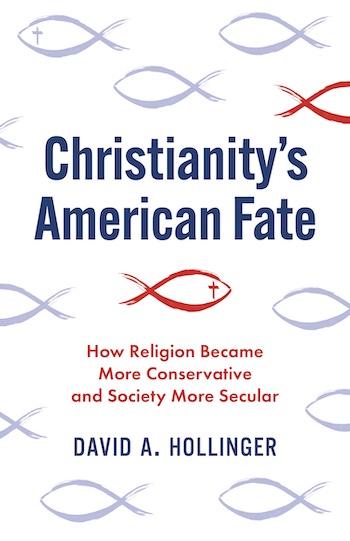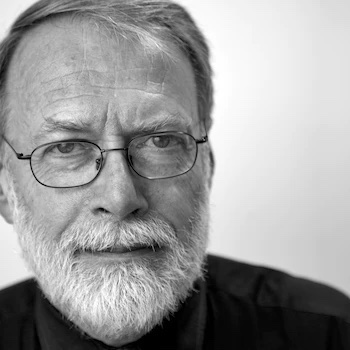Book Review: “Christianity’s American Fate” — Too Much Double-Talk
By Daniel Lazare
Religion is false, unscientific, and morally dubious, and any discussion that doesn’t take that as its starting point will end up going astray.
Christianity’s American Fate: How Religion Became More Conservative and Society More Secular by David A. Hollinger. Princeton University Press, 216 pages, $29.95.
 Jesus of Nazareth — Yeshua Nasoraya in Aramaic — was a preacher who acquired a sizable following in the ancient Galilee but was accused of subversion and executed sometime around AD 33. So what on earth does he have to do with free-market economics, abortion, gay rights, or any of the other controversies that, 2,000 years later, are tearing society apart?
Jesus of Nazareth — Yeshua Nasoraya in Aramaic — was a preacher who acquired a sizable following in the ancient Galilee but was accused of subversion and executed sometime around AD 33. So what on earth does he have to do with free-market economics, abortion, gay rights, or any of the other controversies that, 2,000 years later, are tearing society apart?
That’s the question David A. Hollinger, professor emeritus at UC-Berkeley, wrestles with in Christianity’s American Fate. His language is foggy, but his thesis is clear enough: in the United States, at least, the Jesus movement is undergoing a complex process of splitting and contraction. On one hand, we have liberal and conservative theologians going at one another hammer-and-tong over whether Jesus would have supported the right to life or the right to bear arms or whether his sympathies would be with the other side. On the other, we have growing numbers asking whether any of it even matters since religion no longer makes sense.
This is a big change from the ’50s, when religion was de rigueur. Everyone was supposed to believe in something — though it was poor form to inquire too closely into what that something might be. Dwight Eisenhower spoke for many when he observed that US government makes “no sense unless it is founded in a deeply felt religious sense, and I don’t care what it is.” But then the number of “nones” — people who answered nada when asked about their religion — began to grow. As late as the early ’80s, according to pollsters, their numbers stood at a paltry five percent. But they hit eight percent in 1990, 15 percent in 2000, and, finally, 29 percent in 2021. For respondents in their 20s and 30s, the number hit 40. According to Christianity’s American Fate, all but 0.2 percent of US members of congress still claim a religious affiliation according. Despite that, the writing is on the wall: the arc of history is plainly bending toward atheism and agnosticism. Either Americans now believe that, pace Ike, religion is irrelevant to the health of the republic, or they no longer give a damn.
So Christianity is on the wane. As for the splitting part of the story, it’s something that afflicts all movements — Freudian analysis, surrealism, Marxism, whatever. In Christianity, the tendency goes back at least as far as the fourth and fifth century, when the church divided over the nature of Christ and the trinity. Greek and Latin Christianity then split in 1054, rival popes in Rome and Avignon split in 1378, while papists and Protestants split in 1519. It’s an old habit that just won’t quit. If the latest manifestation is at all distinctive, it’s because one side — the evangelicals — is growing thanks to Donald Trump, while the other, what Christianity’s American Fate calls ecumenical Christianity, seems to be losing steam by the month.
For Hollinger, a liberal who “drifted away from the faith” after his school years but who still “has a feel for it,” it’s yet another case of the best lacking all conviction while the worst are full of passionate intensity. But even he admits that liberal Christianity is a losing cause. “The universalist ideology that had been a defining feature of ecumenical Protestantism,” he writes, “and that served as a justification for its progressive engagements of the 1940s, 1950s, and 1960s, fell under deep suspicion, often accused — with some justice — of serving as a cover for white male privilege.” First, it was too radical, in other words, and then it wasn’t radical enough. Ecumenicals argued for full equality for congregations in Africa, Asia, and Latin America, he adds, only to draw back in confusion when churches in Uganda reached out to US conservatives in order to make common cause in opposing gay rights. Hollinger is sophisticated enough to realize that the Old Testament is not the word of God, but, rather, a collection of disparate texts “cobbled together … in the consolidation of the ancient Hebrews as a single people.” But he still wishes liberal Christians would make greater use of it because, quoting Harvey Cox of the Harvard Divinity School, he thinks that “a historical-critical view of the Bible has deepened, not destroyed, our respect for its truth.”
Has it? Modern scholarship has made it crystal clear that texts like Genesis and Exodus are collections of myths and legends with little connection, if any, to real-life events. So why should we regard their truth value as any greater than, say, that of the Upanishads or the Epic of Gilgamesh?
This sort of double-talk is frustrating, to say the least. But Hollinger really falls down when he takes on the New Atheism, the movement made famous in the early 2000s by writers like Sam Harris, Christopher Hitchens, Richard Dawkins, and Daniel Dennett. As usual, his approach is equivocal. “Christian apologists,” Hollinger writes, attacked the New Atheists for their crude understanding of what religion actually means. “Yet this ritualized dismissal,” he says, “…almost always elided a very important fact. Vast numbers of the faithful espoused the crude ideas the New Atheists attacked.” So the New Atheists were guilty of engaging in crude caricatures except that those caricatures turned out to be not so off-base as apologists maintain.

David A. Hollinger. Photo: Princeton University Press
But this itself is a dodge since the New Atheists’ main thrust was not against religious practice per se, but against the idea behind it. The title of Dawkins’s 2007 bestseller, The God Delusion, says it all. The concept of a supreme being is completely and unalterably false, and any doctrine that says otherwise is going to wind up false as well.
There can be no beating around the bush when it comes to this basic truth. The problem, therefore, is not that evangelical Christians are misusing the Bible, but that anyone, liberal or conservative, is using it at all. To be sure, the Bible is not just a fascinating historical text, but a great read filled with rollicking tales about kings who spy on naked women, brothers who selling their youngest sibling into slavery, donkeys who speak the word of God, and runaway prophets who wind up in the belly of a whale. But as a guide to modern problems, its value is nil. The second-century gnostic Marcion argued that the Hebrew Bible, with its tales of lust and betrayal, was downright evil. But he was wrong. Theories of right and wrong were so underdeveloped that it wasn’t so much immoral as premoral. Any attempt to employ it as a moral guide in the here-and-now is absurd, and the sooner we get that straight, the better.
Hollinger’s failure to do so is why Christianity’s American Fate ends up being a very bad book — windy, meandering, evasive, and unwilling or unable to face up to the real issues at hand. He’s right that evangelical Christianity has become a mainstay of a radical right that is moving in an ever more antidemocratic direction. But his half-hearted quasi-defense of “ecumenical” Christianity is undermined by his unwillingness to deal with the real reason it is doing so badly. It’s foundering not because supporters are not making their points more effectively, but because those points no longer make sense. Religion is false, unscientific, and morally dubious, and any discussion that doesn’t take that as its starting point will end up going astray. Hollinger quotes the fifth-century theologian Augustine of Hippo on the need to combat “mischievous false opinions.” But poor old Augustine, religious liberalism’s favorite whipping boy, gets a bad rap. When it came to combating religious falsity, he figured that one could never be too sharp, angry, or intolerant. We should feel the same.
Daniel Lazare is the author of The Frozen Republic and other books about the US Constitution and US policy. He has written for a wide variety of publications including Harper’s and the London Review of Books. He currently writes regularly for the Weekly Worker, a socialist newspaper in London.
Tagged: Christanity, Christianity’s American Fate, David A. Hollinger


I guess if it were suggested to me that I write a review of an important new book about golf, in which I have no interest whatsoever and which I agree with Mark Twain is “a good walk spoiled,” I would suggest that I am not the suitable reviewer of this book, which WOULD be of interest to many people. But Daniel Lazare accepted this assignment to review a book about the place of Christianity in modern society, a topic in which he obviously has no interest, and instead of taking the book seriously used the space to fire off a rant against Christianity (and apparently, all religious belief) as a total crock in which no one of intelligence believes. Though it’s often fun to indulge one’s animi, my view is that if one honestly regards a book as a frightful waste of trees, one should pass on reviewing it.